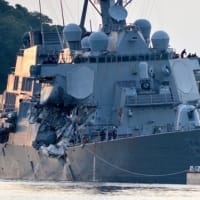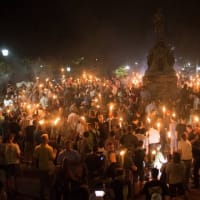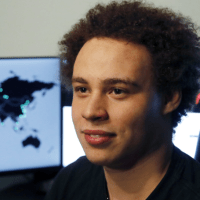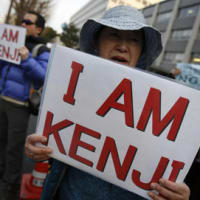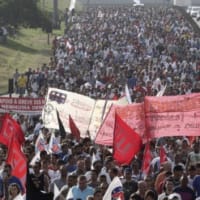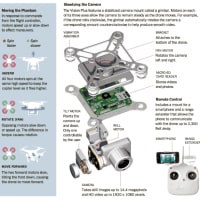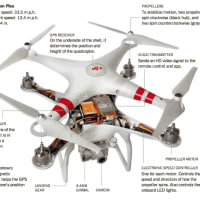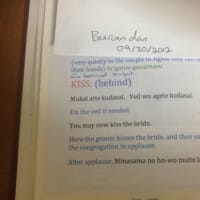After Years Of Struggle, Veteran Chooses To End His Life
何年にもわたる苦悶ののち、負傷帰還兵は命を絶つことを選択した。
by Frank Morris
April 07, 2013 5:29 PM
戦争は悲惨だが、人間の歴史から戦争がなくならないのも事実だ、一人の人間の過酷な運命を皆さんはどう理解する?
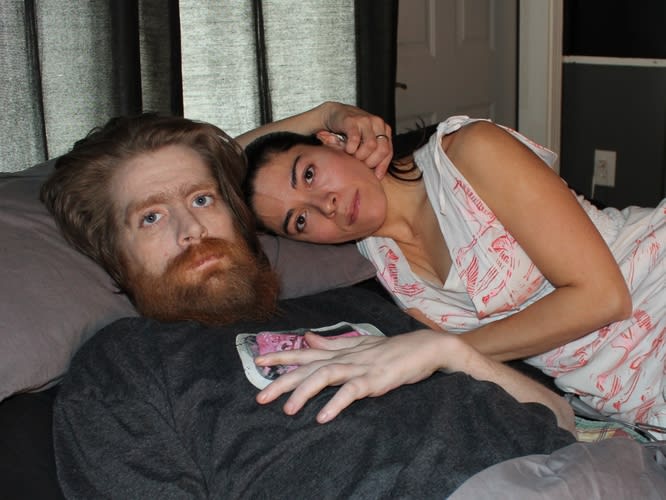
After a dozen years at war, an estimated 2 million active-duty service members will have returned home by the end of 2013. Some reintegrate without much struggle, but for others it's not so easy. The psychological wounds of war can sometimes prove to be just as fatal as the physical ones.
12年もの戦争が終わり、2百万人の兵士が2013年の末までに帰還をすることになる。彼らのうちあるものは何の問題もなく帰国後の生活に適応できるが、そうでないものにとって事は簡単ではない。 戦争で負った心理的な傷は時として肉体的な負傷同様致命的になることさえあることが証明されている。
For injured veterans such as Tomas Young, life is a daily struggle. But this Iraq War veteran, who says his physical and emotional pain are unbearable, has decided to end his life.
トーマス・ヤングのような負傷帰還兵にとって、日々の毎日が苦悶の生活だ。 しかしこのイラク戦争帰還兵は肉体的かつ精神的な痛みは耐えられないとして、人生に終止符を打つことを決心した。
At War 戦争で
Before the attacks of Sept. 11, 2001, Young was an athletic, rambunctious 22-year-old. Now he's a man at the very end of his rope.
Young enlisted two days after the attacks. He wanted revenge against the Taliban in Afghanistan, but was deployed instead to Iraq, a country that he believed had nothing to do with the Sept. 11 attacks.
Days later, a sniper's bullet left him paralyzed from the chest down, impotent and very angry. His terse, powerful way with words propelled him to the forefront of the anti-war movement.
2001年911の攻撃の以前、ヤングは運動好きでやんちゃな22歳の普通の若者だったが、いまは人生の崖っぷちにたつ男である。 ヤングは911の二日後に軍に採用された。彼はアフガニスタンのタリバンに報復することを望んでいたが、アフガンではなく、彼が911と関係ないと思っていたイラクに配属されてしまった。 赴任して数日後、狙撃兵の弾丸が胸から下を麻痺させ、不能し、怒りのもととなった。 彼の簡潔で力強い言葉を伴った行動は彼を反戦運動の先頭にたたせることになる。The documentary Body of War follows Young's activism and physical struggles.
"I'm glad that it came out, and people saw the reality of war," he says. "But now, I can't even watch it, because it serves as a reminder of what I used to be able to do."
Young now spends much of his time lying flat on his back, smoking, in his dimly lit bedroom in Kansas City, Mo.
ドキュメンタリー「ボディオブウォー(戦争の身体)」はヤングの行動主義と肉体的な戦いを追った。 “私は、このドキュメントが人々が戦争の実態を知るきっかけになったことをうれしく思っている。”と彼は言う。今ヤングはミズーリ州のカンザスシティの薄暗い部屋の中で横になったまま煙草をふかして殆どの時間を過ごしている。
His life got progressively worse after returning home. A blood clot lodged in his lungs months after the film came out. That damaged his brain, twisted his hands and left his speech impaired. His mother, Cathy Smith, says it's been a long, hard fight.
"To be a paraplegic, deal with that, and then wake up and you're a quadriplegic, and you can't use your voice, which is what you were learning to use," she says. "So many people wanted him to speak, and he couldn't speak anymore."
帰還後彼の生活は悪化の一途をたどった。 ドキュメントが世に出た数か月後、肺に血栓ができ、これが脳に障害をおこし、両手を捻じ曲げてしまい言語障害を起こしてしまった。彼の母親のキャシー・スミスは長い過酷な戦いだったと話している。 “半身不随になる、それに対処していたら、ある日目覚めて四肢麻痺になるそして言葉を失う、そう言葉を使うべき学んでいたまさにその声をうしなってしまったの”“多くの人は彼が話すのを望んだけど、彼は二度と話すことは出来なかったわ。”と彼女は話す。
Love And Loss 愛と喪失
Young spent months in rehab; last spring he married a woman named Claudia Cuellar, a Buddhist with a sunny disposition. Young is a devout atheist, but they both love music and literature, and share a keen understanding of the hardships of war.
"He is, of course, my No. 1 hero," she says. "Along with all ... Iraq, Afghanistan, Vietnam — all veterans."
ヤングはリハビリに数か月を費やした、昨春クラウディア・キューラーという女性と結婚した。 彼女は仏教徒であり明るい性格の持ち主だった。 ヤングは全くの無神論者だが、彼ら二人は音楽と文学を愛した。 そして戦争の過酷さに対する深い理解を共有していた。“彼は、もちろん、私の一番のヒーローです。 彼はイラク、アフガニスタン、ベトナム・・すべての帰還兵士とともにあります。”
They settled in for what they hoped would be a few good years together. But last summer, a horrible, new chronic pain hit Young. Doctors cut out his colon, hoping to ease his suffering. That worked for a while, but the pain came back.
"I decided that I was no longer going to watch myself deteriorate," he says.
In February, Young announced he was going to remove his feeding tube and stop taking the nearly 100 pills a day. Cuellar says she understands.
彼らは望んでいたように居を構えて数年ともに良い時を過ごした。しかし、昨年の夏、恐ろしい、新たな慢性的な痛みがヤングを襲った。 そこで医者達は彼の痛みを和らげるために結腸を摘出した。 この手術は、しばらくは功を奏したが、痛みは再び彼を襲った。“私は、私がこれ以上酷くなるのを見るのに耐えられないと決心した”と彼は言った。 2月にヤングは栄養剤のチューブを外し、一日100錠にものぼる薬の服用を止めることを宣言した。 彼女も理解を示している。
"His body's been mutilated. I mean, he had the injury, but then there's all the surgeries they've done on top of that," she says. "It feels dehumanizing."
In the nine years since Young was shot, his mother's had a lot of time to contemplate losing him.
"I've mourned the son that I sent to war, that didn't come home," she says. "I've mourned the grandchildren that I'll never have. The worst part about all of this for me is that none of this had to happen."
“彼の身体は切り刻まれてきた。彼は負傷したが、それ以上にすべての手術が彼を痛めてきた。 それは非人間的ですらある。”と彼女は言う。 ヤングが撃たれて9年の間、彼の母親は息子を失うことを常に思い詰めてきた。 “私は息子を戦場に送り出したことを嘆き苦しんだが、もう戻らない。 私は二度と会えなくなった孫たちを思い嘆き悲しんだ。 すべての中で最悪のことは、それらが必ずしも起きるべくして起きたことではないということです。”
'He's Just Stopping' 彼はただやめたいのです。
Hearing of Young's plight, activist Ralph Nader suggested he write an open letter to former President George W. Bush and Dick Cheney — one final broadside against the war and its chief proponents.
"So I went along with that and wrote my letter, and I guess that thing's taken off like wildfire, too," he says.
Young's "Last Letter" from a dying veteran went viral. But he insists that, while the letter is political, his impending death is entirely personal.
"There are people who want to frame it as a political decision, or a political issue, that's their prerogative, yay for them," he says. "But I myself don't see it that way."
ヤングの苦境を聞いて、活動家のラルフ・ネーダーはヤングに元大統領のジョージブッシュとデック・チェイニーに公開レターを書くように勧めている。 最後の反戦の一撃をその戦争の主要な推進者に加えるために。 “だから、その勧めに従って、私の手紙を書いた。これは燎原の火のごとく広がると思う。” ヤングの死の淵からの最後の手紙は急速に広まるだろう。しかし彼は手紙は政治的だが、自分の差し迫った死は全くの個人的なものだと言う。 “戦争を政治的な決断として政治の範疇でとらえたがる人々がいるが、そのように囃し立てるのは彼らの特権です。 しかし、私はそうは考えない。”
Young sees it as a solution to intractable suffering, but he knows that other veterans also suffer mightily and choose to live. He's also aware that many people abhor suicide; in fact, his mother is one of them.
ヤングは死を、手におえない苦痛に対する一つの解決策だと考えている。しかし、彼は他の負傷帰還兵が勇敢に生きる道を選び痛みと戦っているのも知っている。 彼はまた多くの人々が自殺を忌み嫌うのも知っている。事実、彼の母親がそうである。
"It's not a suicide. He's not killing himself, he's just stopping," his mother says.
The Patient Self-Determination Act of 1990 allows competent adults to refuse care, says Sandra Silva, director of graduate studies at the Center for Practical Bioethics in Kansas City, Mo.
“これは自殺ではない。彼は自らを殺そうとはしていない、ただ止めるだけだ”と母親は言う。 1990年の患者の自己決定法は判断力のある成人が手当てを拒否することを認めているとミズーリ州のカンザスにあるプラクティカル・バイオエシック(生命倫理)センターの大学院のサンドラ・シルバ部長は話している。
"A health care provider can follow the instructions of a patient and not provide or withdraw medically administered nutrition and hydration," she says.
Young says he'll stop talking to the media on April 20, his wedding anniversary, and likely end his life a month or two thereafter
“ヘルスケアーの提供者は患者の指示に従って医学的に管理された栄養及び酸素吸入の提供あるいは停止をすることが出来る。” ヤングは彼の結婚記念日である4月20日にメディアに話すことをやめると言っている。そして1~2か月後に人生の幕を引くつもりである











